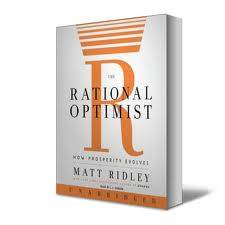|

Summary
"Life is getting better—and at an accelerating rate. Food availability, income, and life span are up; disease, child mortality, and violence are down — all across the globe. Though the world is far from perfect, necessities and luxuries alike are getting cheaper; population growth is slowing; Africa is following Asia out of poverty; the Internet, the mobile phone, and container shipping are enriching people’s lives as never before. The pessimists who dominate public discourse insist that we will soon reach a turning point and things will start to get worse. But they have been saying this for two hundred years.
Yet Matt Ridley does more than describe how things are getting better. He explains why. Prosperity comes from everybody working for everybody else. The habit of exchange and specialization—which started more than 100,000 years ago—has created a collective brain that sets human living standards on a rising trend. The mutual dependence, trust, and sharing that result are causes for hope, not despair."
Source: www.amazon.com
Excerpts and Quotes
On other creatures:
"They may occasionally use tools, they may occasionally shift their ecological niche, but they do not "raise their standard of living", or experience "economic growth". They do not encounter "poverty" either."
"At some point, human intelligence became collective and cumulative in a way that happened to no other animal."
"For culture to turn cumulative, ideas needed to meet and mate."

Source: www.rationaloptimist.com
"Exchange is to cultural evolution as sex is to biological evolution."
"The rich have got richer, but the poor have done even better."
"Falling consumer prices is what enriches people."
"I have consumed goods and services from dozens of countries already this morning."
"Interdependence spreads risk."
"Evolutionary change happens largely by the replacement of species by daughter species, not by the changing of habits in species."
"Crucially, they did not expand or shift their niche. They remained trapped within it."
"Trade is opften unequal, but still benefits both sides."
"The Tasmanian market was too small to sustain many specialised skills. (...) It seems the hunter-gathering lifestyle was doomed if too isolated."
"The success of human beings depends crucially, but precariously, on numbers and connections."
"Human cultural progress is a collective enterprise and it needs a dense collective brain."
"Collaboration between unrelated strangers seems to be a uniquely human achievement."
"Within hours or days of meeting a new tribe, every explorer is bartering."
"...trust growth seems to precede income growth."
"Zero-sum thinking dominates the popular discourse."
"Contrary to the cartoon, it was commerce that freed people from narrow materialism, that gave them the chance to be different."
"Like Milton Friedman, I notice that "business corporations in general are not defenders of ree enterprise. On the contrary, they are one of the chief sources of dangers." They are addicted to coporate welfare, they love regulations that erect barriers to entry to their small competitors, they yearn for monopoly and they grow flabby and inefficient with age."
"Half of the biggest American companies of 1980 have now disappeared by take-over or bankruptcy; half of today's biggest companies did not even exist in 1980."
"Each empire was the product of trading wealth and was itself the eventual cause of that wealth's destruction."
"Merchants and craftsmen make prospoerity; chiefs, priests and thieves fritter it away."
"Trade emerged from the interactions of individuals. It evolved. Nobody was in charge."
"The Phoenicians diaspora is one of the great untold stories of history. ...was there ever a more admirable people than the Phoenicians? Tehy knitted together not only the entire Mediterranean (...) yet they never had an emperor, had comparatively little time for religion and fought no memorable battles."
"China's best moments cam when it was fragmented, not unnited."
"Because it is a monopoly, government brings inefficiency and stagnation to most things it runs."
"By 1920, for example, 80 per cent of all beef eaten in London was imported, mostly from Argentina."
"There is not a single example of a country opening its borders to trade and ending up poorer."
"Increasing self-sufficiency is the very signature of a civilisation under stress, the definition of a falling standard of living."
"...it would take 150 slaves, working eight-hour shifts each, to peddle you to your current lifestyle."
"...the economist Stanley Jevons opined in 1865: "It is thence simply inferred that we cannot long continue our present rate of progress", adding: "it is useless to think of substituting any other kind of fuel for coal.""
"Innovation is not a predictable business and it responds poorly to dirigisme from civil servants."
"Yet was the mood of 1830 optimistic? No, it was just like today: fashionable gloom was everywhere."
"For 200 years pessimists have had all the headlines, even though optimists have far more often been right."
"Every generation has underestimated the potential for finding new recipes and ideas."
"The bottom-up world is to be the great theme of this century."
|